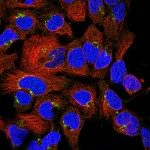Lien vers Pubmed [PMID] – 26480298
Commun Integr Biol 2015 May-Jun;8(3):e1036206
We previously reported that PrP GPI-anchor signal peptide (GPI-SP) is specifically degraded by the proteasome. Additionally, we showed that the point mutation P238S, responsible for a genetic form of prion diseases, while not affecting the GPI-anchoring process, results in the accumulation of PrP GPI-SP, suggesting the possibility that PrP GPI-anchor signal peptide could play a role in neurodegenerative prion diseases. We now show that PrP GPI-SP, when expressed as a cytosolic peptide, is able to localize to the mitochondria and to induce mitochondrial fragmentation and vacuolarization, followed by loss in mitochondrial membrane potential, ultimately resulting in apoptosis. Our results identify the GPI-SP of PrP as a novel candidate responsible for the impairment in mitochondrial function involved in the synaptic pathology observed in prion diseases, establishing a link between PrP GPI-SP accumulation and neuronal death.

